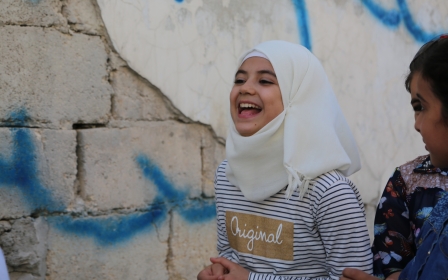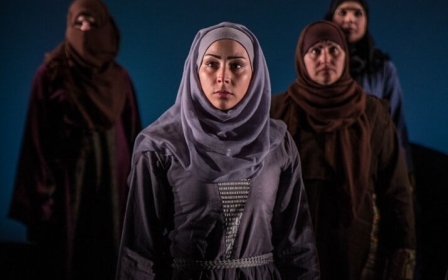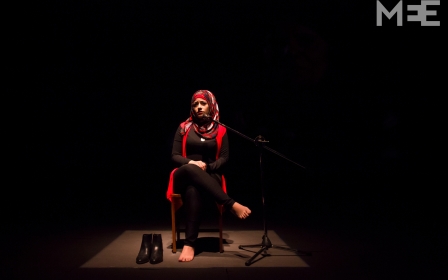In pictures: Idlib theatre production tackles trauma of Syria's prisons
Local actors prepare to perform in front of a packed theatre at Idlib's Cultural Centre for a performance of the play Under Zero. Written by the Syrian playwright Ibrahim Sarmini, the story revolves around the experiences of a group of men detained in a government prison, where they are subject to torture and the mental strain of captivity in poor conditions. (All images: Ali Haj Suleiman)
Idlib is the only major Syrian city still in opposition hands and one of the few places in the country where open criticism of Syria's President Bashar al-Assad in the arts is possible. Here an actor has had his face painted to mimic the bruises prisoners get after beatings by guards. The white hoods represent their ghostlike presence within the jails.
Cut off from the outside world, the vast majority of prisoners have little contact with their loved ones for years at a time. Many relatives of those imprisoned have no real idea if they are alive or dead.
The UN estimates that there were 100,000 political prisoners in Syria as of 2019, and rights groups say that a majority of those people were held by the Syrian government.
Sarmini, who uses a higher but unconfirmed figure, says: "We are trying to convey the message that there are 128,000 people detained in Syrian regime prisons for no reason except expressing their opinion. They are subjected to the most severe forms of torture daily and have lost even the most basic human rights."
Actor Zakaria Saflo (pictured) says: "It is important to remember that the violence we depict in the production does not even represent a small part of what people are actually going through in the regime's prisons."
As well as portraying the physical abuse that prisoners experience, the play also deals with the mental health issues arising from captivity. In this scene, a father is heard speaking and playing with his son, who only exists in his head. The man breaks down in anguish when the image of his child gives way to reality.
The strongest evidence for the widespread use of torture in Syrian prisons was brought to light in 2013 with the Caesar leaks. A military defector smuggled out of the country tens of thousands of images of dead bodies bearing the marks of torture. Many of those pictured were subsequently identified by family members, who up until then did not know the fate of their loved ones.
Playwrights across the globe have long used theatre to deal with the issue of torture and the traumas associated with it. For many in the audience in Idlib, the themes brought up by the play ring true to their own experiences, as either they themselves have been through the Syrian prison system or have relatives who have.
In the play's climactic scene, a Syrian prison guard delivers a death blow to a prisoner he has been interrogating under torture. After he is finished, he casually records the prisoner's identifying number.
Ibrahim Sarmini began his career as a theatre actor in 1998 and later moved on to writing and directing his own productions. He has been involved in dozens of plays in Syria and has won three national awards for his acting.
Once home to a proud theatre tradition, the war in Syria has left the country's arts industry in tatters. Original productions are a particular rarity in opposition areas. The audience were enraptured by the performance.
As in some other rebel-held areas of northern Syria, crowds in public areas are segregated along gender lines. This is a reflection of prevailing social mores in the region, as well as enforcement of conservative interpretations of Islamic law by the armed groups that rule the area.
Middle East Eye propose une couverture et une analyse indépendantes et incomparables du Moyen-Orient, de l’Afrique du Nord et d’autres régions du monde. Pour en savoir plus sur la reprise de ce contenu et les frais qui s’appliquent, veuillez remplir ce formulaire [en anglais]. Pour en savoir plus sur MEE, cliquez ici [en anglais].




